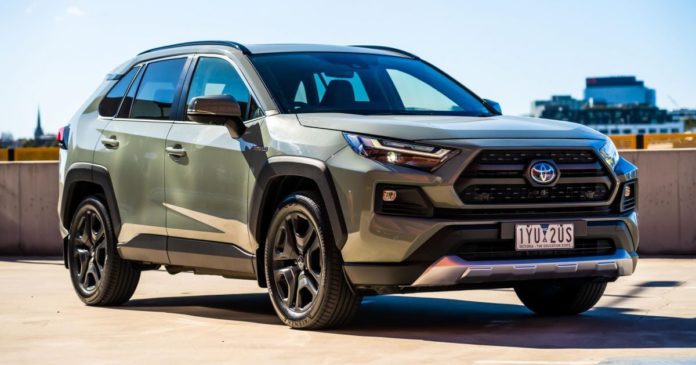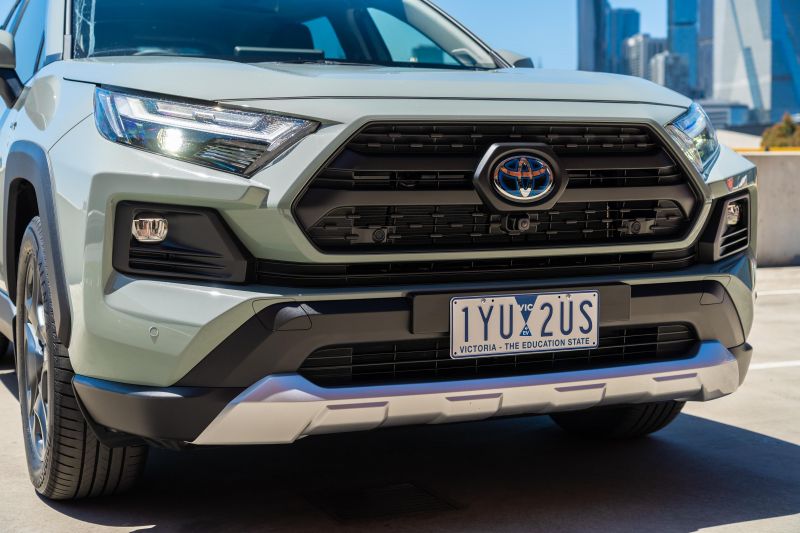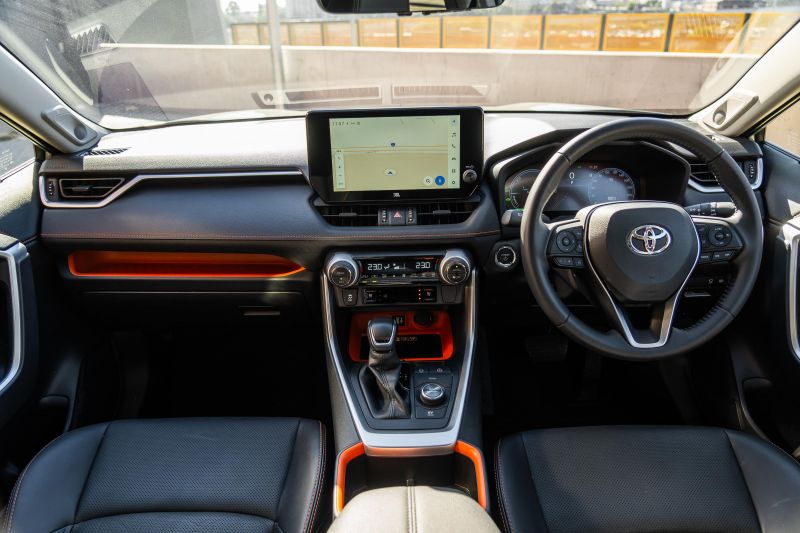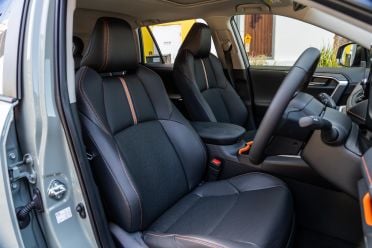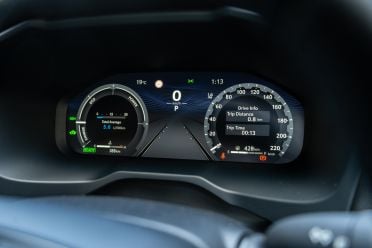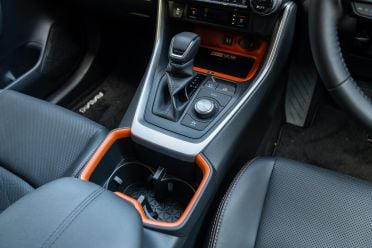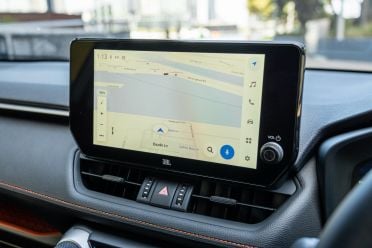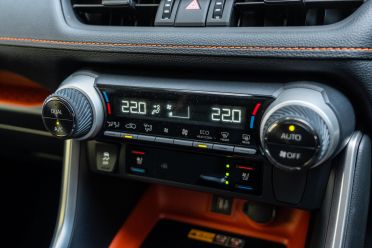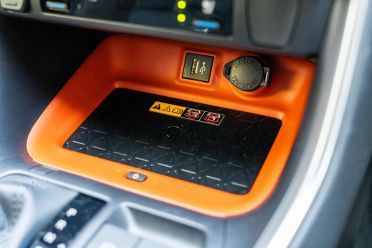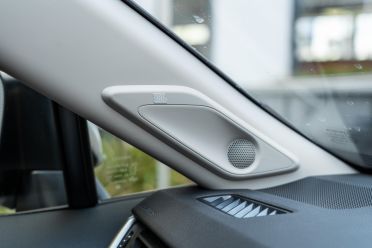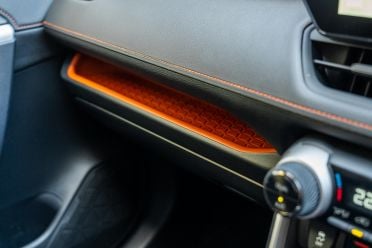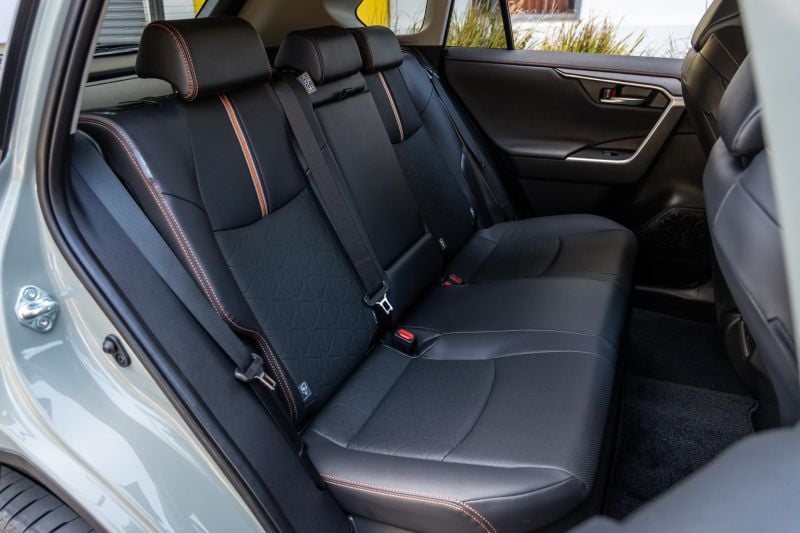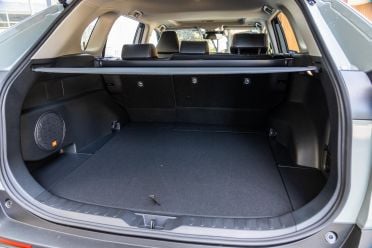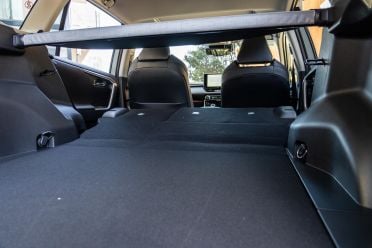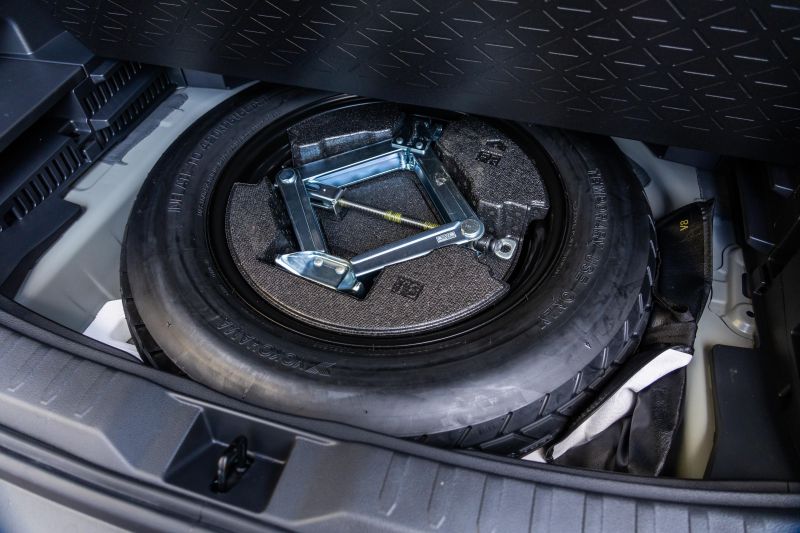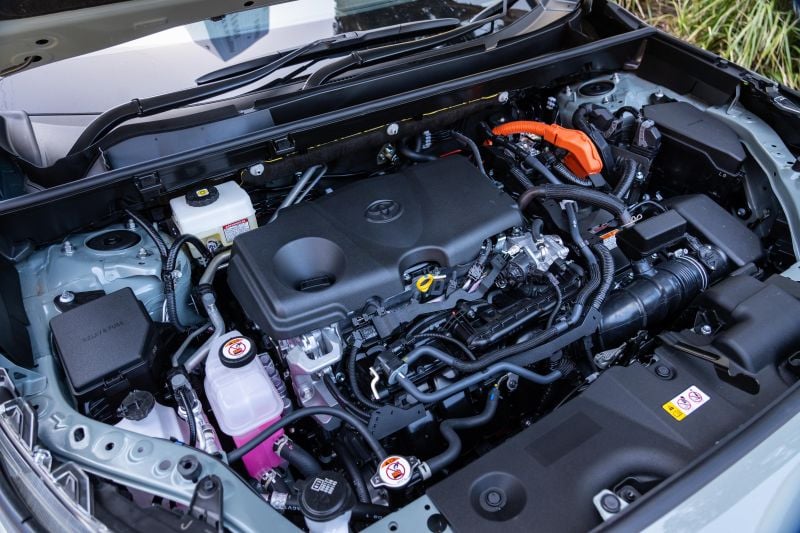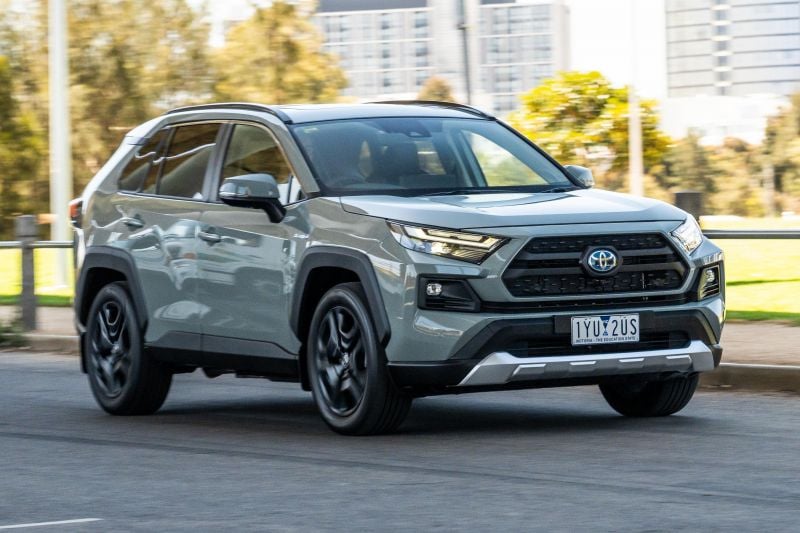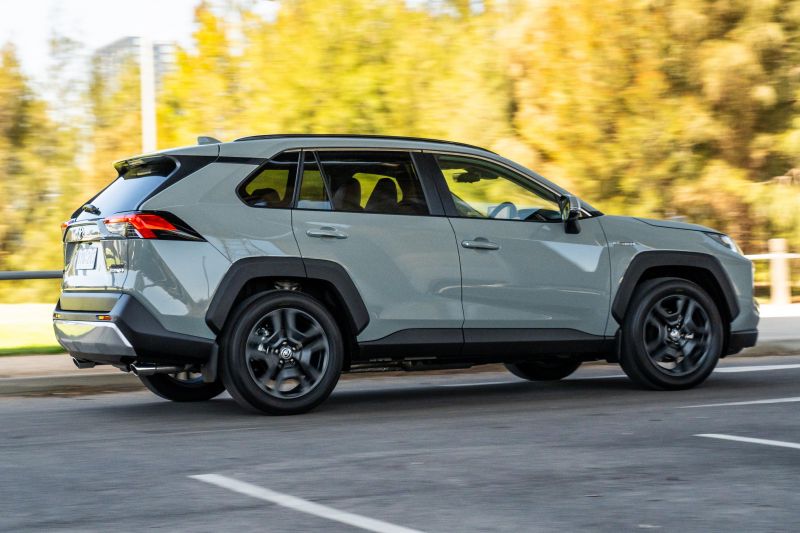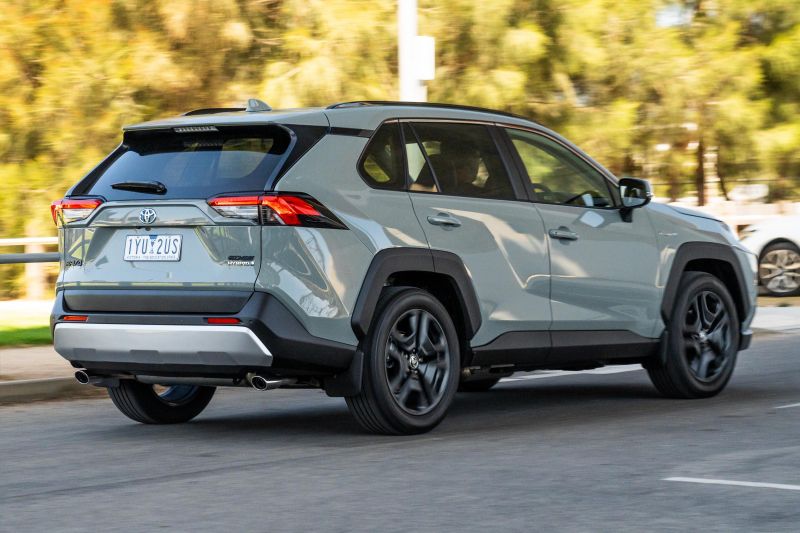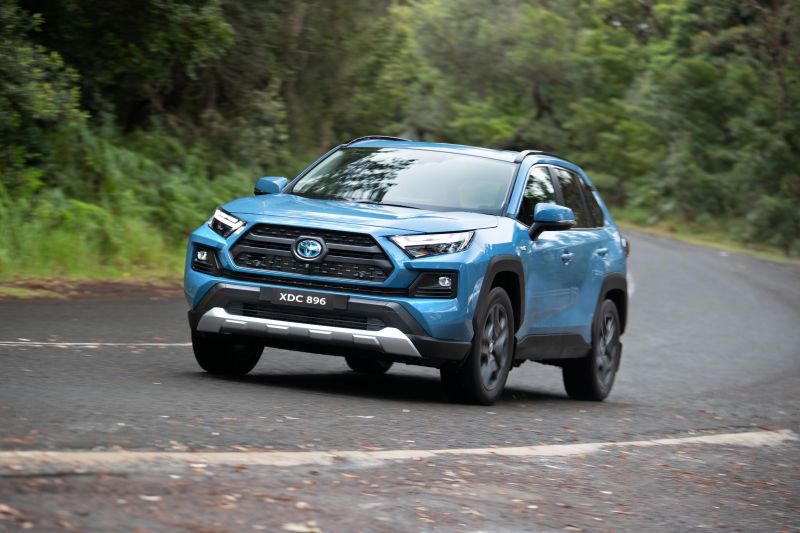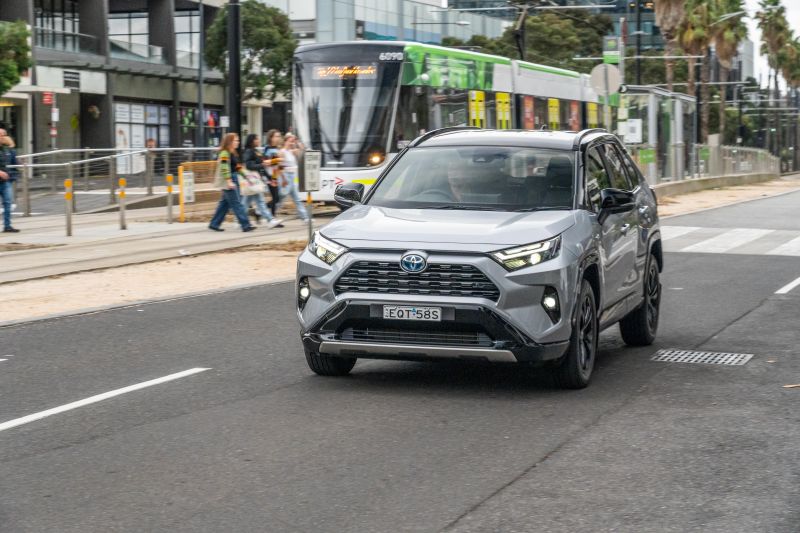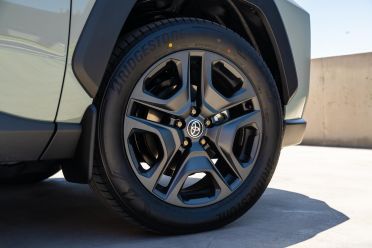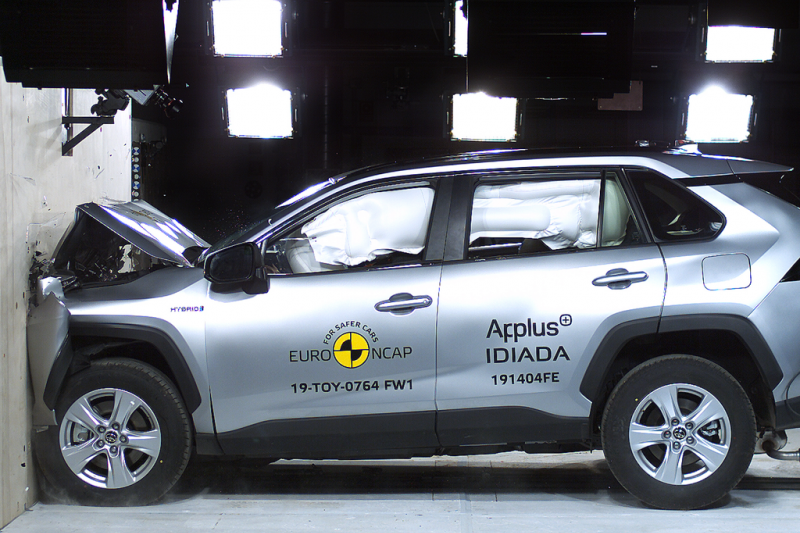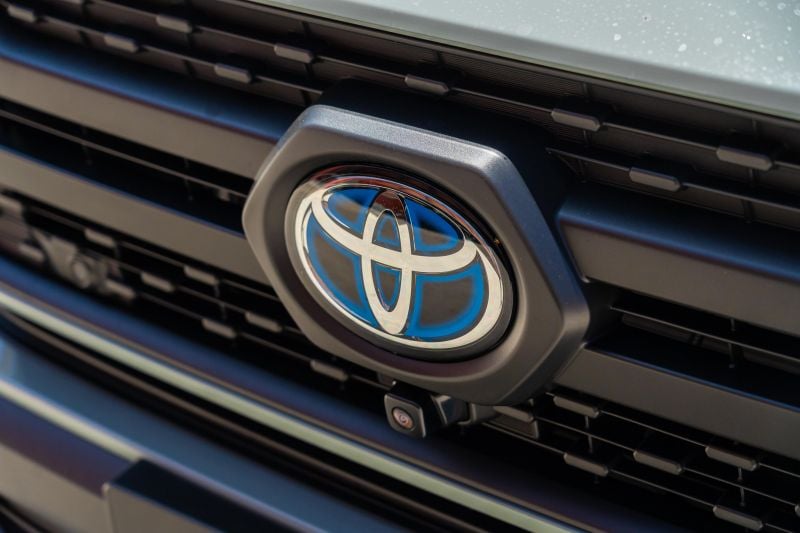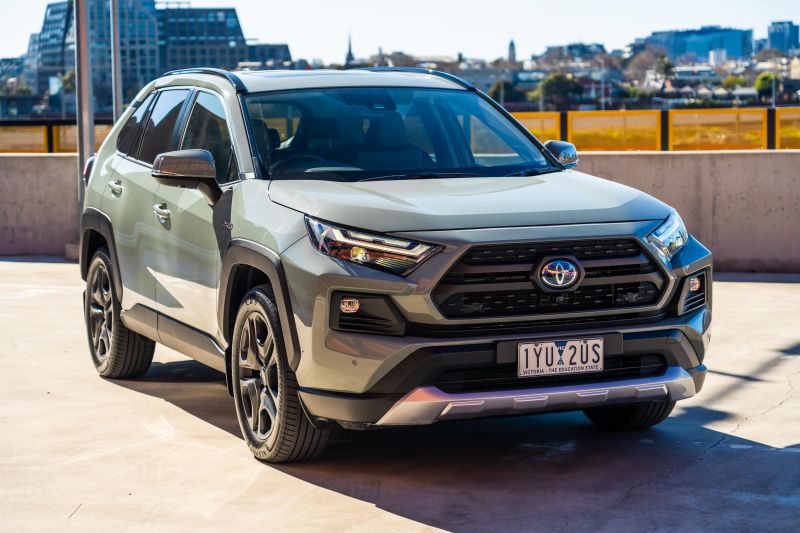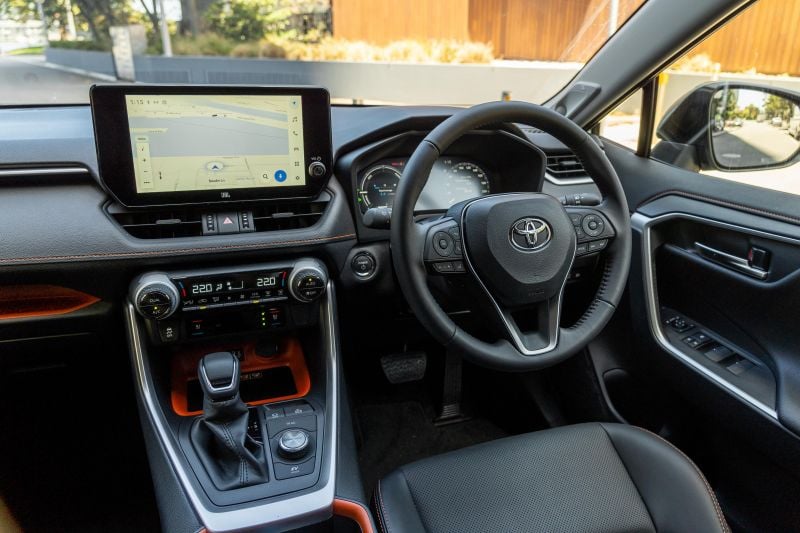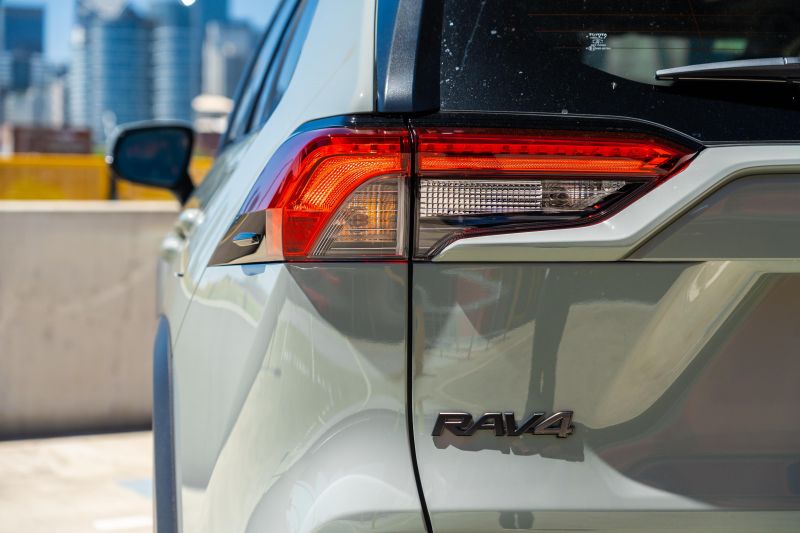The Toyota RAV4 is now hybrid-only!
The Japanese brand is doubling down on its fuel-saving hybrid tech, and has now dropped petrol engines across its core passenger and crossover lineups that had existing hybrid options.
While this may seem like a big deal, a whopping 94.2 per cent of RAV4s sold in the first half of this year were equipped with the 2.5-litre four-cylinder hybrid powertrain. This is an even higher split than the Kluger (76.9 per cent) and Corolla Cross (85.8 per cent).
Compared to the last few years, Toyota now claims to have a much more plentiful supply of RAV4s which has resulted in wait times closer to four months. It’s a far cry from the more than 24-month wait for top-spec hybrid examples in the midst of the COVID-19 pandemic.
Thanks to this the RAV4 achieved a new delivery record in July. With 5933 examples delivered to Australian buyers during the month it was only behind the Ford Ranger and Toyota HiLux for top spot.
When the current RAV4 debuted locally in 2019 it was well ahead of the pack, but things haven’t really changed too much since its latest update in 2022.
There are also a considerably more hybrid options in the hot-selling mid-size in 2024. Is it still the benchmark for the segment? Read along to find out.
How does the Toyota RAV4 compare?
View a detailed breakdown of the Toyota RAV4 against similarly sized vehicles.

Toyota
RAV4
How much does the Toyota RAV4 cost?
On test here is the flagship RAV4 Edge Hybrid which only comes in all-wheel drive.
| Model | Price before on-road costs |
|---|---|
| 2024 Toyota RAV4 GX 2WD Hybrid | $42,260 |
| 2024 Toyota RAV4 GX AWD Hybrid | $45,260 |
| 2024 Toyota RAV4 GXL 2WD Hybrid | $45,810 |
| 2024 Toyota RAV4 GXL AWD Hybrid | $48,810 |
| 2024 Toyota RAV4 XSE 2WD Hybrid | $48,910 |
| 2024 Toyota RAV4 Cruiser 2WD Hybrid | $51,410 |
| 2024 Toyota RAV4 XSE AWD Hybrid | $51,910 |
| 2024 Toyota RAV4 Cruiser AWD Hybrid | $54,410 |
| 2024 Toyota RAV4 Edge AWD Hybrid | $58,360 |
To see how the Toyota RAV4 lines up against the competition, check out our comparison tool.
What is the Toyota RAV4 like on the inside?
Much like it has been for a few years now – blocky and user-friendly.
The RAV4 is an easy car to get in and out of thanks to its high-riding crossover SUV profile. This is helpful for those with limited mobility and can’t step too far up or down into a vehicle.
Once you’re in you’re presented with some rather inoffensive-looking faux leather seats that Toyota dubs SofTex. They’re soft to the touch but I’m not certain how they’ll last in long run as our tester which has only 6000km already has some creasing on the bolsters.
The driver’s seat has 10 ways of electric adjustment which is plenty find the perfect seating position for many people. I personally like how much thigh support you can dial in as it helps those with longer legs sit comfortably.
I also like how much lumbar support you can either pump up or deflate. I injured my back recently and I never got uncomfortable behind the wheel like I have in some of the RAV4’s rivals.
Both the front seats are heated but even in their highest seating they don’t get very hot. There’s also ventilation which is helpful during summer.
A handy feature about the RAV4 is it remembers what you had the seating heating/cooling set as when you last drove the car. This means you don’t need to smoosh the button to turn it on again.
Ahead of the driver is a typical Toyota steering wheel that feels nice in the hand, though after holding it for a while made my hands get a little clammy. It would be nice if there were some perforations to help regulate hand heat.
The steering wheel doesn’t offer any heating which is a little bizarre given the Edge is the flagship variant in the range. Many of its rivals offer this feature as it is a great convenience feature when you first hop in on a cold morning.
All the buttons on the steering wheel are logically placed and have a clicky action when pressed. This makes it fun to interact with.
Behind the steering wheel is a full-width 12.3-inch digital instrument cluster that looks great and offers high-resolution. The layout is rather simplistic but you can customise a few different widgets to display various driving information, as well as themes.
The digital instrument cluster is nowhere near as configurable as Volkswagen Group vehicles however, and a majority of the customisation options are locked once you start driving, which is a classic Japanese car trait.
What do look nice are the transitions that occur when you change drive modes. They take over the entire screen and have animations that show the RAV4 driving.
Moving across the centrepiece of the dashboard is the 10.5-inch touchscreen infotainment system. It’s a fantastic unit that’s a far cry from what Toyota used to offer.
The touchscreen appears to have plenty of processing power, which means it boots up quickly upon startup and new pages load snappily. It’s also very responsive to touch inputs which should appease iPad users.
The menu structure in the touchscreen is simple and clear, meaning it’s hard to get lost in. Unlike the older touchscreen however, there are no physical shortcut buttons on either side.
Instead there’s only a singular volume knob which is annoyingly on the driver’s side and doesn’t provide any ratcheting feedback when turned. This is much better than press buttons however.
In terms of smartphone mirroring, the RAV4 offers wired and wireless Apple CarPlay. Android Auto on the other hand is disappointingly wired only.
With my iPhone 15 Pro Max connected wirelessly I didn’t experience any dropouts during my week of testing. This is pretty surprising as I drive through known interference points on my way to the office which catch a lot of systems out regularly.
There’s also a wireless phone charger tucked subtly at the front of the centre console. It charged my plus-sized phone pretty well, though nothing secured it in place which caused it to slide around and off the charging pad at points.
Satellite navigation is built into the touchscreen infotainment and is really easy to use. It’s also connected to the internet which means there’s live traffic and routing.
Looking around the cabin the RAV4 Edge Hybrid stands out with its orange highlights. It’s an acquired taste that I can completely understand is not for everyone. It definitely differentiates this flagship variant from the rest of the range.
I’m a big fan of the chunky, yet funky climate control setup that has cartoonishly large rubber temperature knobs for. It’s also nice to have clearly labelled physical buttons for every other climate control-related function as so many carmakers are now integrating this into the touchscreen.
One strange inclusion in higher-spec RAV4s is a digital rear-view mirror. This doesn’t really make sense in this car, unless you have the boot loaded up, as all-round visibility is excellent thanks to the large amounts of glass.
The majority of the main touch points including the armrests and dashboard are soft, though understandably there are harder plastics down lower. I do wish there were softer finishes where my legs rested on the centre console.
Something I’ve never noticed in other RAV4s I’ve sampled is the amount of flex some of the interior elements have. Pushing the centre console from side to side causes it to move substantially, as well as the climate control pod.
Despite this there were no loud creaks or rattles in the cabin throughout my testing, which leads me to wonder whether the amount of flex is intended.
Moving to the second row there’s a considerable amount of space for a mid-size SUV. It’s a rather nice place to be actually as you can stretch out and relax for long journeys. A similarly sized sedan offers more space however.
At a leggy 182cm I had lots of leg-, head-, shoulder- and head space in the second row of the RAV4. Thanks to the large side windows there’s also plenty of visibility.
It would be very easy to do two-up in the second row and pushing it to three is doable for the most part. Having three large adults sat across the bench would get a tad squishy, however.
In terms of second-row amenities there are air vents mounted on the back of the centre console, USB-C ports, and a fold-down armrest with cupholders. There’s only one map pocket on the front passenger seatback, as well as small door pockets.
At the back there’s a power tailgate but it takes forever to open and beeps incessantly throughout the process. It’s rather embarrassing if you’ve parked in a busy carpark.
Once the tailgate is open however, the RAV4 Hybrid has a rather large boot. At 542-580 litres with the rear seats upright, it’s a really usable space that’s both wide and deep.
There’s a retractable cargo cover that’s great at hiding things you have stowed away in the boot, though it does feel a little cheap and flimsy. I almost expect something a little nicer in a car that costs $60,000.
Lastly, under the boot floor there’s a temporary space-saver spare wheel. This is surprising as many hybrid SUVs are no longer coming with a spare wheel at all.
| Dimensions | Toyota RAV4 Edge AWD Hybrid |
|---|---|
| Length | 4615mm |
| Width | 1865mm |
| Height | 1690mm |
| Wheelbase | 2690mm |
| Cargo capacity | 542-580 litres (5-seat) |
To see how the Toyota RAV4 lines up against the competition, check out our comparison tool.
What’s under the bonnet?
The RAV4 Edge is now only offered with the hybrid all-wheel drive powertrain. Every other variant is available with a cheaper hybrid front-wheel drive option.
| Specifications | Toyota RAV4 Edge AWD Hybrid |
|---|---|
| Engine | 2.5L 4cyl petrol + 2 electric motors |
| Engine outputs | 131kW / 221Nm |
| Electric motor outputs | 88kW / 202Nm + 40kW / 121Nm |
| System outputs | 163kW |
| Battery | 6.5Ah nickel-metal hydride |
| Transmission | e-CVT |
| Driven wheels | AWD |
| Weight | 1760kg (kerb) |
| Fuel economy (claimed) | 4.8L/100km |
| Fuel economy (as tested) | 5.9L/100km (260km urban driving) |
| Fuel tank capacity | 55 litres |
| Fuel requirement | 91 RON |
| CO2 emissions | 109g/km |
| Emissions standard | Euro 5 |
| Braked tow capacity | 1500kg |
Throughout of my testing it was absolutely freezing in Melbourne, which meant the heater was cranking and the heated seats were on their highest setting. It also meant the petrol engine wasn’t willing to be switched off for very long.
During one particular five-minute trip up the road to grab a coffee the petrol engine didn’t switch off at all, resulting in an average fuel consumption of 13L/100km.
On the flip side, while travelling into the office for approximately 45 minutes in heavy peak-hour traffic I achieved 4.4L/100km, which is fantastic for a vehicle this size.
To see how the Toyota RAV4 lines up against the competition, check out our comparison tool.
How does the Toyota RAV4 drive?
When you start up the RAV4 Hybrid with the push-button starter, there’s a singular beep that lets you know the car is ready to be driven. A ‘ready’ icon also displays on the digital instrument cluster.
The reason for the start beep sound is because the car starts silently without the petrol engine. It typically fires to life quietly a second or two however to warm up the engine fluids.
The petrol engine will stay on for a fair while, especially if it’s bone cold, to ensure it’s at operating temperature and to charge up the battery a tad. Realistically this only takes a couple of minutes.
Initial acceleration in the RAV4 Hybrid is usually under electric power, especially if you’re light on the throttle. On a hill or with harder acceleration the petrol engine will kick on almost immediately, though.
In all honesty I expected the RAV4 Hybrid to offer more electric oomph, especially as this model has an electric motor-generator on the rear axle. Instead it very readily calls upon the petrol engine to assist with acceleration.
This is likely down to how Toyota still equips this model with a nickel-metal hydride battery pack, rather than a more sophisticated and energy-dense lithium-ion unit.
Thankfully the RAV4 Hybrid’s petrol engine does fire rather seamlessly. If you weren’t paying full attention you likely wouldn’t know it has come to life until it starts revving.
Despite having a total system power output of 163kW, the RAV4 Hybrid AWD doesn’t feel overly fast from behind the wheel. Instead it feels like you need to coax it to get to speed, and when you push it harder the engine revs flare.
There is a ‘Sport’ mode that can be selected which makes acceleration feel snappier, though it feels like it’s against this car’s fuel-saving ethos. With this in mind the ‘Eco’ drive mode is better suited.
It doesn’t take long for petrol engine’s note to get old. Given the RAV4 is equipped with an electronic continuously variable transmission (e-CVT) it has an annoying drone that just hovers at the same revs. This isn’t uncommon as this type of transmission typically prioritises efficiency rather than driver engagement.
Once you reach cruising speeds around town the engine usually switches off, depending on the battery charge and outside ambient temperature, among other factors. One of the few times the engine would refuse to switch off however was when I had the heater and heated seat cranking in almost freezing Melbourne weather.
EV cruising in the RAV4 Hybrid is very quiet and serene as there’s only the odd electric motor hum. It’s almost like a game to eke out as much electric driving as possible because the petrol engine does notably dull the driving experience.
There is a dedicated ‘EV’ drive mode but it will switch off as soon as you press the accelerator just that bit too hard, or when the battery charge is too low.
Both electric motors help with initial acceleration, but as soon as you get above 40km/h only the front electric motor drives the car. It reactivates around certain corners for added security, but ultimately it makes the rear electric motor a little redundant.
Regenerative braking in this vehicle only has one setting, but it strikes a nice balance between being too weak or too strong. Under light deceleration only the front electric motor regenerates energy, but letting off the accelerator completely lets the rear electric motor help out.
The regenerative braking also negates that annoying CVT speed creeping you sometimes get when travelling down a hill.
There is a degree of added regenerative braking built into the brake pedal, though the transition to the physical brakes when coming to a complete stop can be a little jarring. It doesn’t take long for the battery pack to charge up. This is nice because this equals more EV driving.
Around town and in the city the RAV4’s ride is very compliant despite having large 19-inch alloy wheels. Even sharp potholes and speed bumps don’t unsettle this car like they do in some other mid-size SUVs.
You do hear what the suspension is doing however because the car is already so silent. This doesn’t ruin the driving experience but it’s more pronounced.
The steering has a nice weight to it when tossing the car around on low-speed streets, while not being too unwieldy to twirl in tight carparks.
As standard the RAV4 Edge Hybrid comes with front and rear parking sensors, as well as a surround-view camera with fantastic quality and multiple views.
-
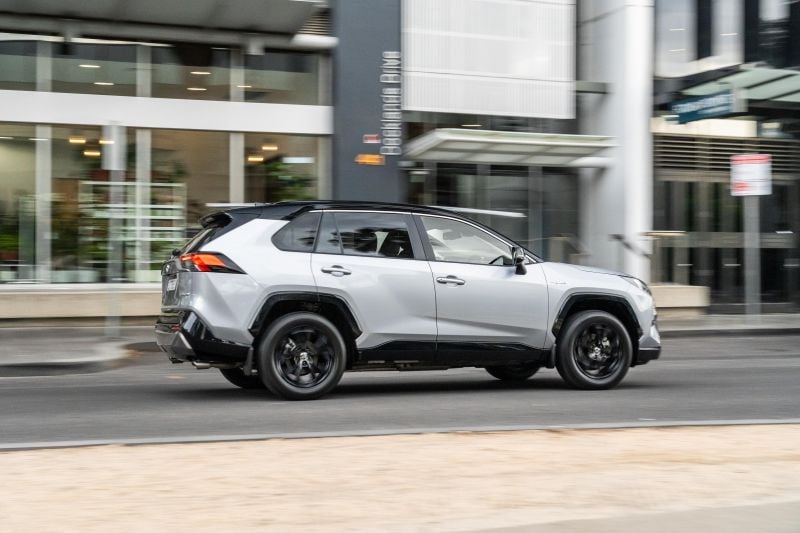
XSE Hybrid shown
Getting out on the open road the 2.5-litre petrol engine stays on almost constantly, though the electric motors do help reduce the load and cut fuel consumption. It’s also when the engine drone is most apparent.
At points the engine does switch off at higher speeds, especially when travelling downhill.
The highest speed I was able to drive on electric power alone was around 80km/h. These moments were only fleeting as the engine fired back to life very rapidly once the electric motors were out of their depth.
The RAV4 is a very comfortable car to cruise the highway in with poised steering and compliant steering. It’s also somewhat dynamic, even though the added heft of the battery pack is noticeable on sweeping high-speed corners.
On the safety front the adaptive cruise control system is great. It does default to the furthest distance every time it’s activated for the first time though, which is a little frustrating.
The lane-keep assist is largely good at keeping you in the lane if you start drifting out, though it can sometimes intervene incorrectly.
The lane centring function on the other hand can be a little too hands-on for my liking. Thankfully it’s able to be switched off for smoother highway and freeway cruising.
Lastly, the RAV4 Edge Hybrid has fantastically bright LED headlights. This is great if you live in a rural or regional area and need to be able to see far into the distance.
There is also an auto high-beam setting that seems great on paper but in reality it’s a little tentative. There were moments where it would turn off the high-beams very quickly, even if it detected a bright street sign, whereas there were others where there would be an oncoming car and I’d have to manually dip the lights.
What do you get?
The RAV4 is offered in five different trim levels. On test here is the flagship Edge variant.
2024 Toyota RAV4 GX highlights:
- 17-inch alloy wheels (light grey)
- Space-saver spare
- Automatic projector LED headlights
- Automatic high-beam
- LED front fog lights
- Rain-sensing wipers
- Rear mud flaps
- ‘Premium’ steering wheel
- Tilt and telescopic steering wheel adjustment
- 7.0-inch instrument cluster screen
- 8.0-inch touchscreen infotainment system
- Wireless Apple CarPlay
- Wired Android Auto
- Digital radio
- Cloth upholstery
- Push-button start
- Dual-zone climate control
- Rear centre armrest
GXL adds:
- 18-inch alloy wheels (dark silver)
- Rear privacy glass
- Front mudflaps
- Roof rails
- ‘Premium’ gear lever
- Proximity entry
- Auto-dimming rear-view mirror
- Wireless phone charger
XSE adds:
- 18-inch alloy wheels (gloss black)
- Power tailgate
- SofTex upholstery
- Heated front seats
- 10-way power driver’s seat
- 12.3-inch digital instrument cluster
- 10.5-inch touchscreen infotainment system
Cruiser adds:
- Sunroof
- Power-folding exterior mirrors
- 9-speaker JBL sound system
- Leather upholstery
- Heated and ventilated front seats
- 8-way power passenger seat
- Driver’s seat memory
- Ambient lighting
- Digital rear-view mirror
Edge loses driver’s seat memory and the power passenger seat but adds:
- 19-inch alloy wheels (matte grey)
- SofTex upholstery
- 4-way manually adjustable passenger seat
Is the Toyota RAV4 safe?
The RAV4 has a five-star safety rating from ANCAP, based on testing conducted by Euro NCAP in 2019.
| Category | Toyota RAV4 |
|---|---|
| Adult occupant protection | 35.7 out of 38 (93 per cent) |
| Child occupant protection | 43.9 out of 49 (89 per cent) |
| Vulnerable road user protection | 41 out of 48 (85 per cent) |
| Safety assist | 10.8 out of 13 (83 per cent) |
Standard safety equipment includes:
- Adaptive cruise control
- Autonomous emergency braking
- Pedestrian detection
- Daytime cyclist detection
- Intersection assist
- Blind-spot monitoring
- Lane-keep assist
- Lane Trace Assist (lane centring)
- Rear cross-traffic alert
- Emergency Steering Assist
- Speed sign recognition
- Front, front-side and curtain airbags
- Driver’s knee airbag
- Reversing camera
- Front and rear parking sensors
Cruiser and above receive a surround-view camera.
How much does the Toyota RAV4 cost to run?
The RAV4 is backed by a five-year, unlimited-kilometre warranty.
| Running costs | Toyota RAV4 Hybrid |
|---|---|
| Warranty | 5 years, unlimited kilometres |
| Roadside assistance | $99 per year |
| Service intervals | 12 months or 15,000 kilometres |
| Capped-price servicing | 5 years or up to 75,000 kilometres |
| Total capped price-service cost | $1300 |
To see how the Toyota RAV4 lines up against the competition, check out our comparison tool.
CarExpert’s Take on the Toyota RAV4
For a long time now the Toyota RAV4 Hybrid has been the default option for those who want an economical mid-size SUV.
In 2024 however, the competition is now well and truly hot with more hybrid rivals arriving seemingly every month or so.
The RAV4 Hybrid does remain as the benchmark in the segment in many regards, but you shouldn’t get complacent and not consider other similarly sized and priced vehicles.
The Honda CR-V e:HEV, for example, mightn’t be as efficient but its petrol engine fires to life more seamlessly than the RAV4 Hybrid’s.
Additionally, the recently launched Hyundai Tucson Hybrid and Kia Sportage Hybrid twins also form as keen rivals that are worth a look.
Looking solely at the RAV4 range, the flagship Edge variant on test here no longer has any major differentiating factor as it’s no longer available with the non-hybrid 2.5-litre four-cylinder petrol and eight-speed auto.
Instead it only looks tough on the outside and has a wide range of orange interior highlights which mightn’t be for everyone. It also misses out on certain equipment offered in the penultimate Cruiser variant.
With this in mind, either the RAV4 Cruiser or XSE form as the pick of the range, especially with the lighter and more efficient front-wheel drive hybrid powertrain.
Click the images for the full gallery
MORE: Buy a Toyota RAV4
MORE: Everything Toyota RAV4

